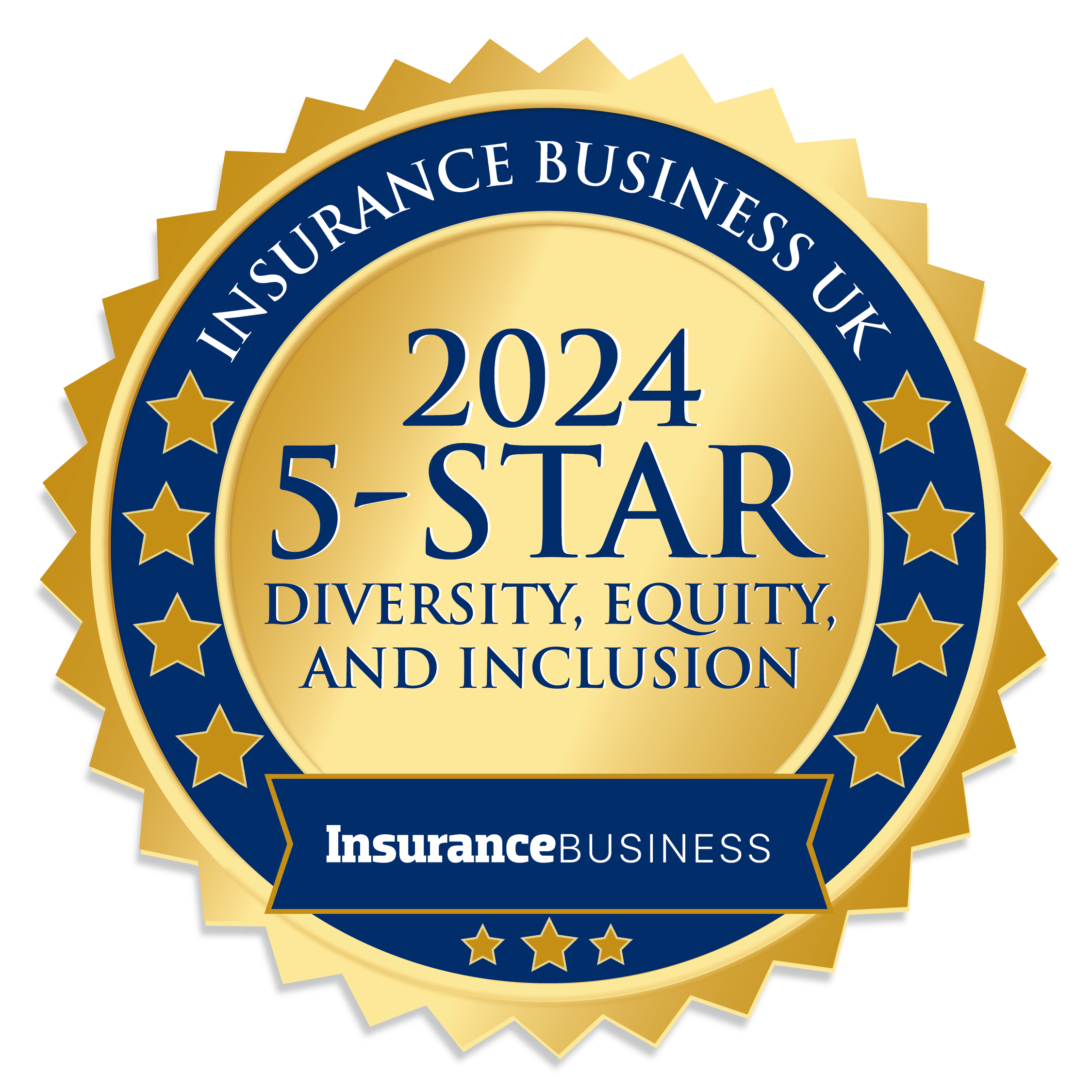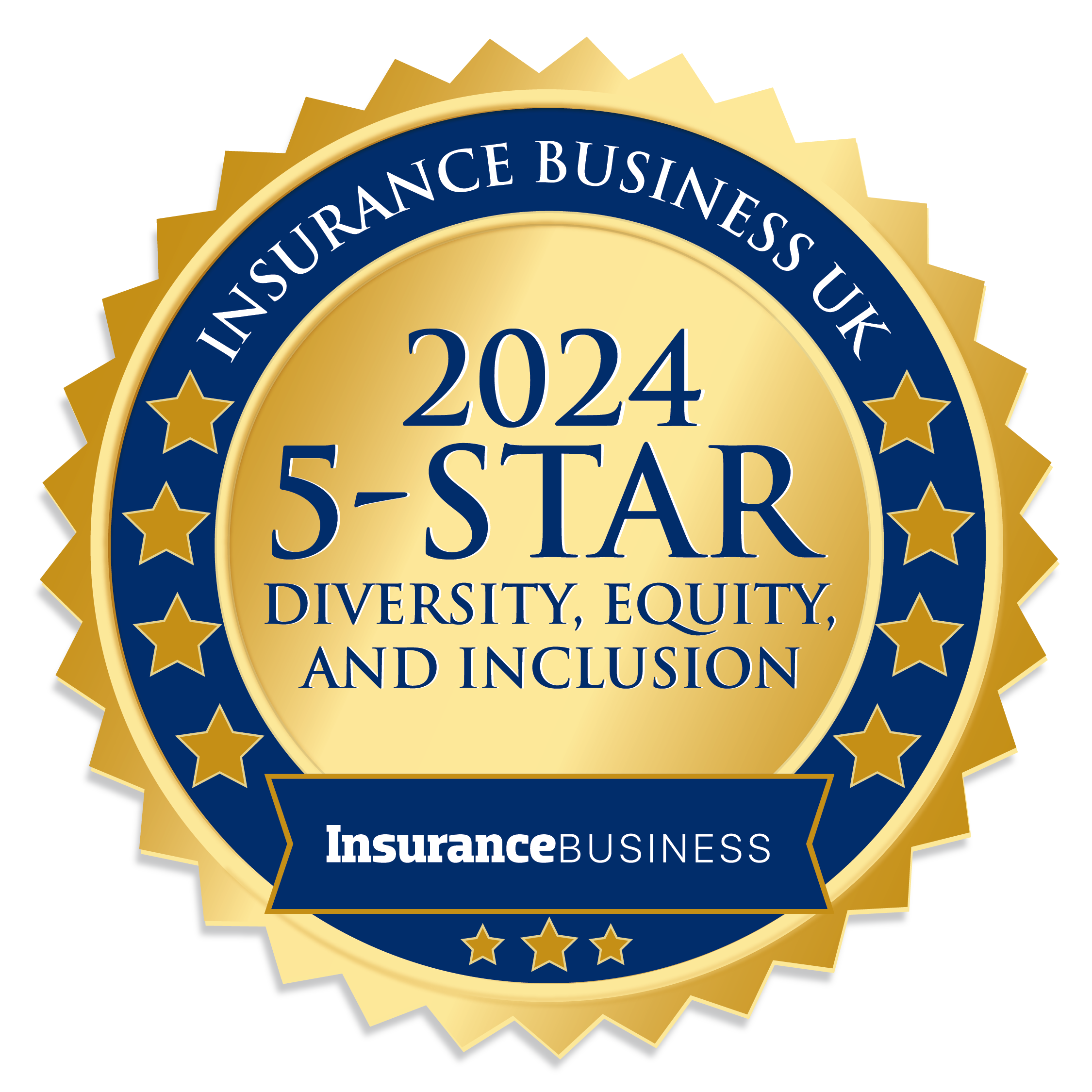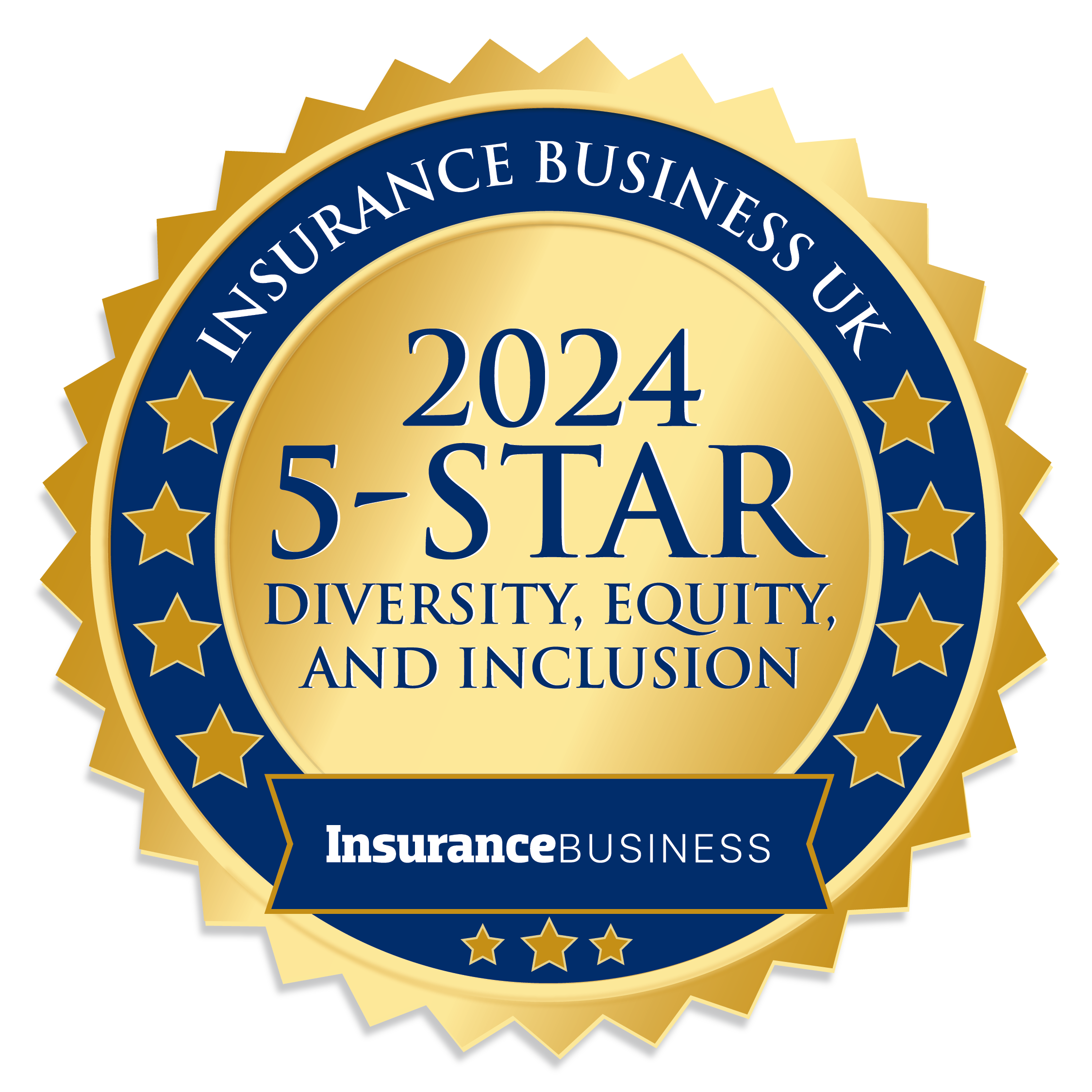
Best Diversity, Equity and Inclusion in the Workplace
in the UK | 5-Star Diversity, Equity and Inclusion
Jump to winners | Jump to methodology
Workplace for all
Insurance Business UK’s 5-Star Diversity, Equity and Inclusion (DE&I) 2024 winners set themselves apart in the industry for their willingness to instill a positive and progressive environment in their workplace.
Research from recruitment specialist Finitas highlights the importance and seriousness of this issue, showing that a non-supportive workplace culture is 10 times more likely to cause insurance employees to quit. Additionally, a less engaged and absent workforce can cost UK employers up to £36 billion annually.
During an extensive 15-week process, IBUK’s researchers conducted one-on-one interviews with DE&I professionals to gain a keen understanding of industry standards for DE&I and determine which companies were at the leading edge. Then they surveyed employees at the nominated companies about the effectiveness of their DE&I program and what matters to them, with the data displayed below:
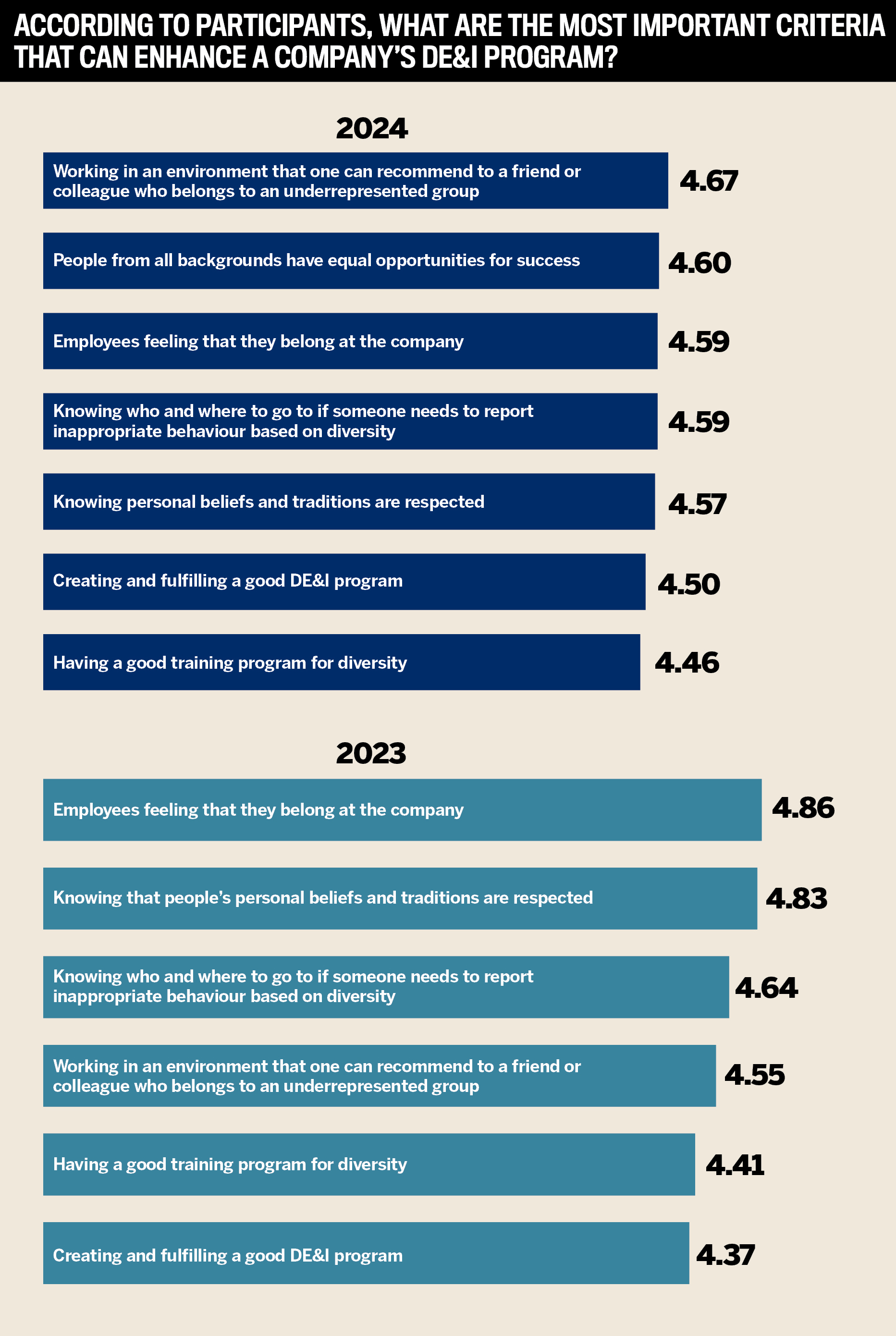
The 2024 data shows that Working in an environment that one can recommend to a friend or colleague who belongs to an underrepresented group is now the biggest concern for respondents, whereas in 2023, it was the fourth most important, despite an extra option being added this year. Similarly, Employees feeling that they belong at the company took the top spot in 2023, but 12 months later it dropped to third.
Highlighting how important DE&I is in the UK’s insurance sector, Rebecca Deegan, chief sustainability officer at the Association of British Insurers (ABI), says, “Diversity, equity and inclusion are key to an effective insurance industry that is representative of the communities it serves. Our sector has made progress in gender representation and ethnic diversity at board and executive levels, but we need to consistently implement strategies across the workforce to achieve equity.”
And she adds, “In 2022, we published our Diversity, Equity and Inclusion (DEI) Blueprint, which sets out actions the industry can take to embed DEI in recruitment practices and how we support existing employees. It also offers guidance and sets measurable objectives to help ABI members develop and expand their DEI strategies.”
The ABI blueprint’s key findings included:
-
47% of insurance and long-term savings firms now collect data on neurodiversity within their organisation, up from 27% in 2020
-
24% of ABI members have a specific policy in place to support neurodiverse employees, up from 14% in 2021
-
The Women in Finance Charter has helped increase the number of women on boards from 19% in 2017 to 32% in 2022
-
Representation of women within executive teams has also increased, from 25% in 2021 to 29% in 2022
-
Black and ethnic minority representation at board level within firms has risen from 2% in 2021 to 6% in 2022
Research by law firm Browne Jacobson further uncovered the need for greater DEI initiatives with the UK’s industry. Their 2023 data shows that over half of their respondents from ethnic identities felt their career progression had been affected by their race.
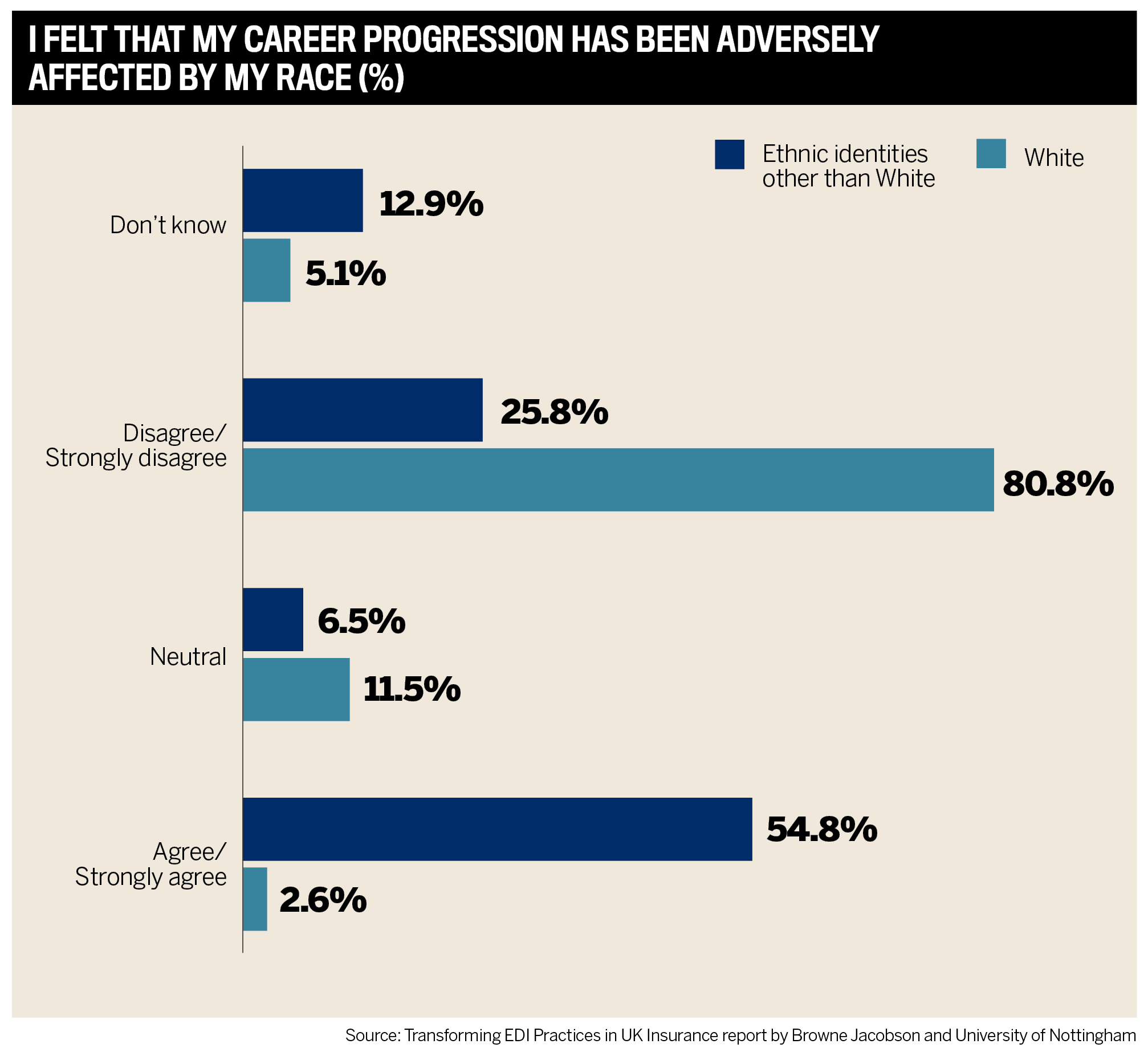
Those who reported experiencing prejudice or discrimination identified the basis as being led by sex, age and race, while other issues included religion, sexual orientation and pregnancy.
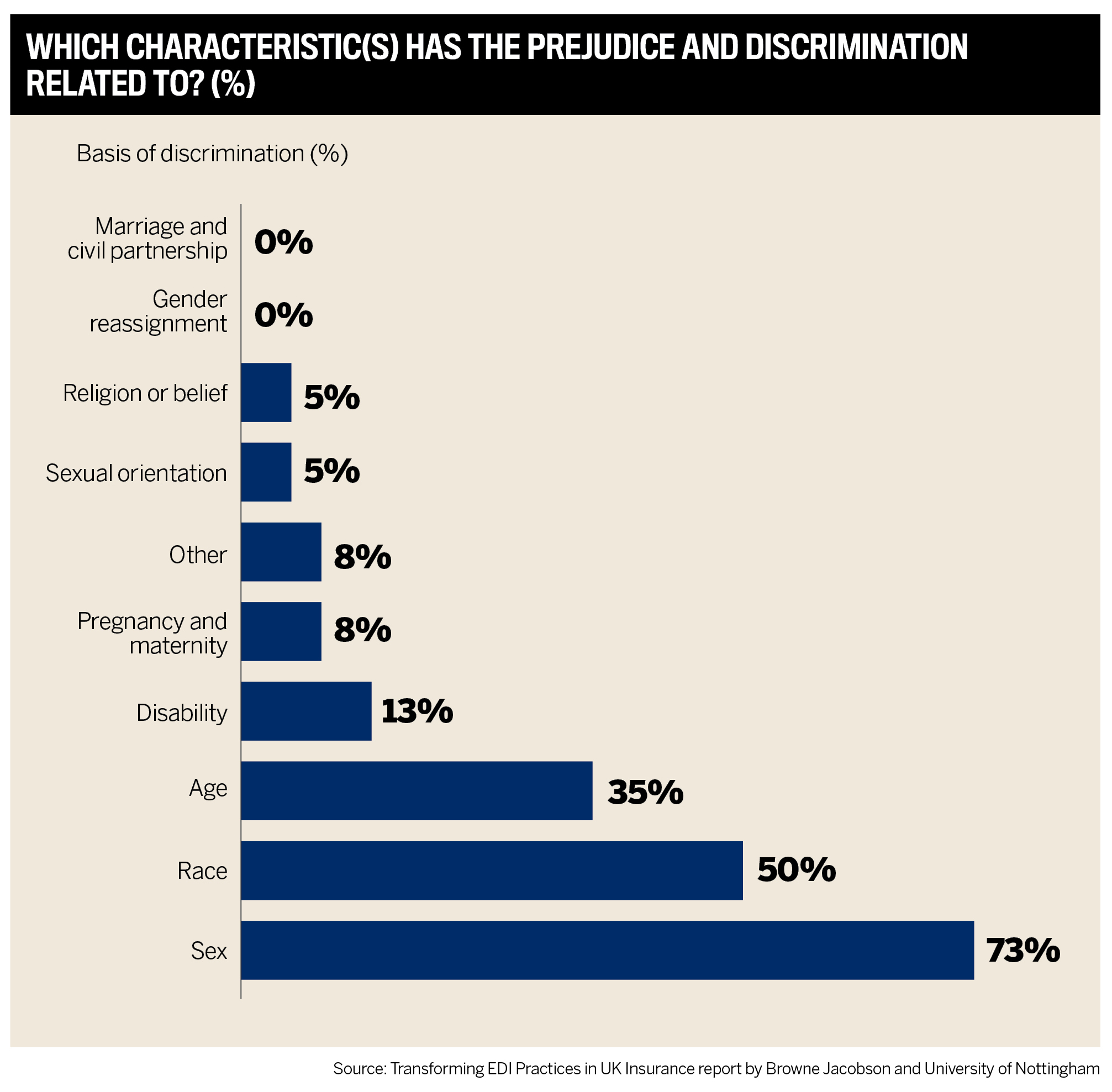
The need to keep going to achieve more with respect to DEI is further shown by data from Finitas, published in June 2024, which focused on issues across gender, minorities and neurodiversity.
-
Female representation in the insurance industry remains relatively stable until the senior management level, where it drops from the mid-forties percentage to 36% and declines further at the higher executive level.
-
Recent data reveals that women in the UK insurance industry earn, on average, 27.9% less than men in the same roles.
-
In 2023, only 3% of senior positions in the UK insurance industry were held by individuals from ethnic minority backgrounds, well below the national average of 6.7%.
-
Recognition of neurodiversity is emerging, with only 14% of companies having policies to support neurodiverse employees.
These findings underline the sterling work and progress of IBUK’s 5-Star DEI 2024 winners, who are advancing equity and inclusion for all amid a challenging status quo.
Insights on best diversity, equity and inclusion in the workplace
IBUK’s comprehensive survey sought feedback from employees on their company’s DE&I programs. Respondent comments included:
-
“It would be great to see more senior leaders from more diverse backgrounds, with more women in leadership positions.”
-
“More executives should be involved in DE&I events to show their support rather than just writing emails or posting online, as it seems more like a tick-box mentality.”
-
“Promote more major religious occasions and festivals.”
-
“Current procedures and practices are modern and industry leading.”
-
“Better consistency at team levels, encouraging cross-team conversations to ensure that we can continue to learn from each other and more actively and widely incorporate inclusive behaviour.”
What do the best diversity, equity and inclusion workplaces look like?
A successful environment in the UK insurance industry sees people from all backgrounds receive equal opportunities for success, which organisations can achieve by implementing:
-
unbiased recruitment and promotion
-
training
-
an inclusive culture
-
mechanisms for reporting DE&I issues
The Insurance Cultural Awareness Network (iCAN), an independent, volunteer-run network that supports multicultural inclusion across the insurance sector, believes a number of initiatives are key:
- diverse hiring panels
-
clear, merit-based criteria for promotions
-
training internal recruiters and senior managers on DE&I topics
-
regular audits and reviews of these processes to identify and eliminate potential biases
-
investing in mentorship and sponsorship programs specifically designed to support underrepresented groups
“Leading companies should encourage open and regular dialogue about diversity and inclusion within the organisation so that leaders at all levels are visibly committed to these values. This commitment is reflected in their actions, such as inclusive leadership behaviours and equitable decision-making processes,” says Ajay Mistry, iCAN founder and director. “The tone from the top is critical, and it is important for the C-suite to be sending this message throughout the organisation.”
iCAN also highlights the need to create a sense of belonging through an inclusive workplace culture where employees feel valued and accepted via initiatives such as:
-
promoting and celebrating diversity through ERGs
-
holding staff networks and diversity councils
-
introducing cultural competence training
Effective training is also a cornerstone of any successful DE&I strategy.
“Companies should go beyond basic compliance training to offer comprehensive programs that cover unconscious bias, cultural competence and inclusive leadership. These need to be more in-depth and informative than simple yearly computer-based individual learning programs,” Mistry says. “They are not one-off events but part of an ongoing learning journey, with regular refreshers and advanced sessions for deeper engagement, and are implemented throughout all training within the business.”
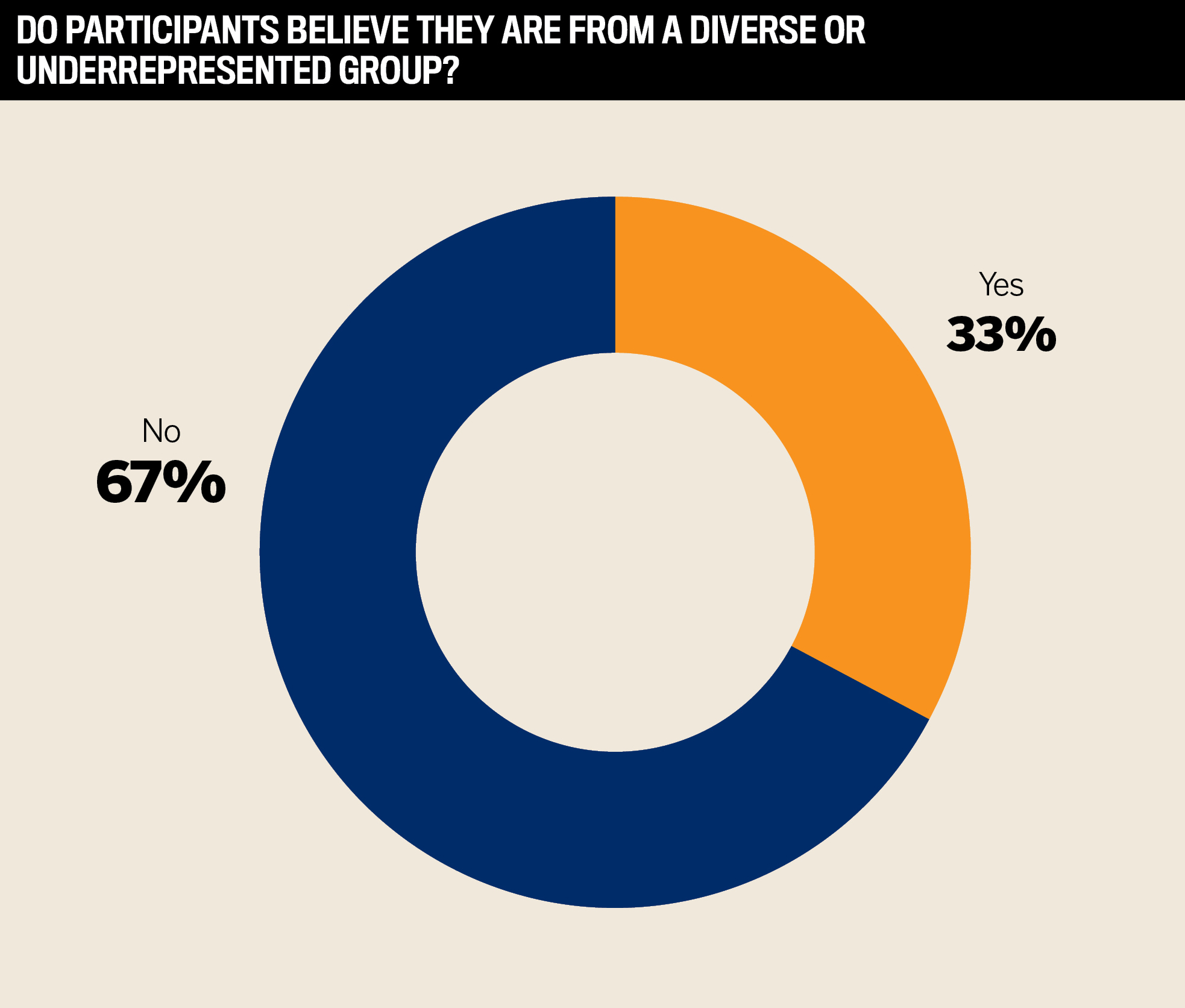
Echoing this message is the Diversity Trust, a community interest company established in the UK. It undertakes large-scale auditing, consultancy projects, research, training and strategic projects across the corporate, public, private, voluntary, community and social enterprise sectors in the country.
Its work involves core themes such as:
-
anti-racism
-
challenging sexism and misogyny
-
disability and mental health awareness
-
transgender rights
CEO Berkeley Wilde believes DE&I is a “mixed picture” in the UK corporate sector.
“Some businesses and organisations embrace and put diversity and inclusion initiatives front and centre, but you also have a lot that are tick-box in the way they meet their DE&I targets, and it’s not the core of their mission. Then you have organisations that aren’t even thinking about DE&I, and it’s not even on their agenda.”
Wilde also highlights the need for strategies to be bespoke.
“It’s about fairness. I would never argue for anything other than that it’s the right person for the job, but in the past, you would struggle to get into these organisations, you were excluded. However, in the past 10-15 years, companies have been inviting you in,” he explains.
“Organisations will place different values on their initiatives, and there is some real leadership around it, but I have also experienced directly where an organisation will think, ‘You can bring in training, and that’s diversity done.’ Whereas it’s about implementing culture and values and centering the whole organisation’s ethos and mission around them.”
A concerted effort to improve DE&I in the workplace continues to deliver recognition for Arch Insurance International, which has been honoured with its second successive IBUK 5-Star DE&I award.
This continued success derives from its three core pillars:
-
colleagues
-
communities
-
culture

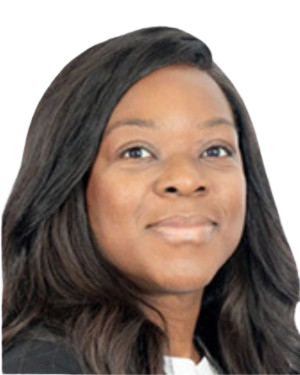
Marcella McLeanArch Insurance International
“We strive to build a workforce that reflects the communities in which we work and the markets we serve,” says Marcella McLean, chief human resources officer. “We do this by driving social mobility through partnerships with customers and stakeholders and cultivating a supportive and inclusive culture where all our employees can thrive.”
And she adds, “By leveraging the unique perspectives and experiences of our employees, we’re able to drive innovation, enhance our capabilities and ultimately deliver a better service to our brokers and mutual clients.”
Improving year on year
Arch Insurance International continues to deliver tangible differences as a result of launching several community initiatives over the past 12 months.
-
KareHero benefit, designed to support employees with elder care responsibilities
-
Veterans & Allies employee network, a platform for networking, mentorship and advocacy for colleagues who have served in the armed forces, have friends or family in the armed forces, or want to support those who have served
-
Insurance Supper Club, working closely with the organisation to support the development and advancement of women in the insurance industry
-
Partnering with SEO London, offering opportunities for underrepresented and underserved groups to enter professional services
-
New partnership with Progress Together, an organisation that promotes socio-economic diversity in financial services
“We introduced guiding principles for succession planning, creating a consistent process that helps ensure we build a strong pipeline of future leaders who reflect the diversity of our organisation and the communities we serve,” McLean adds.
Creating an inclusive culture
It’s necessary to adopt a multifaceted approach that engages employees at all levels.
Effective ways of doing this are:
-
training managers to equip them with the knowledge and skills to lead diverse teams
-
providing “in-time” coaching to support managers facing challenges and opportunities related to inclusivity
“We recognise that leadership buy-in is essential for creating an inclusive culture, as it’s their responsibility to set the tone and direction of the company,” shares McLean. “When leaders endorse and demonstrate our desired behaviours, known internally as ‘The Arch Experience,’ they become an example for others in the business to follow.
“We encourage open and candid communication at all levels and provide multiple channels for employees to share their perspectives and experiences. We seek to create a safe environment that fosters innovative thinking and a mindset of continual improvement and growth.”
Giving feedback
Establishing clear and accessible channels, such as anonymous hotlines and online reporting tools, is paramount to making it easier for employees to report DE&I issues.
“Companies must build a culture of trust where employees feel safe to report issues without fear of retaliation. This trust is built through consistent and transparent handling of reported cases, demonstrating the organisation’s commitment to accountability and justice,” Mistry says.
Arch Insurance International integrates HR business partners into various areas of its structure, enabling them to gain a deeper understanding of the distinct needs and challenges within each group and effectively address them.
“We have ‘open house’ sessions, where these partners can share key messages and receive questions or feedback in return,” McLean says. “We conduct employee surveys and have a Culture Committee that measures the company’s pulse in relation to morale and culture, ensuring employee voices are heard and acknowledged. All these feedback mechanisms provide valuable insights and help us identify areas for continual improvement.”
Best Diversity, Equity and Inclusion in the Workplace in the UK |
5-Star Diversity, Equity and Inclusion
- Instant Underwriting
- Munich Re
- NFP
Insights
-
 Ajay Mistry
Ajay Mistry
Founder and Director
The Insurance Cultural Awareness Network
Methodology
To determine the insurance companies with the most effective DE&I programs, the Insurance Business research team first invited firms in the UK to share the DE&I initiatives they had focused on over the past 12 months.
During a 15-week process, the team conducted one-on-one interviews with DE&I professionals to gain a keen understanding of the industry standards for DE&I and find out which companies had met or exceeded those expectations. After receiving nominations for DE&I initiatives, the team reached out to the companies’ employees to gauge the effectiveness of these programs. The companies that scored 4 or higher on a scale of 1 to 5 were recognised for having 5-Star DE&I programs.
Keep up with the latest news and events
Join our mailing list, it’s free!


